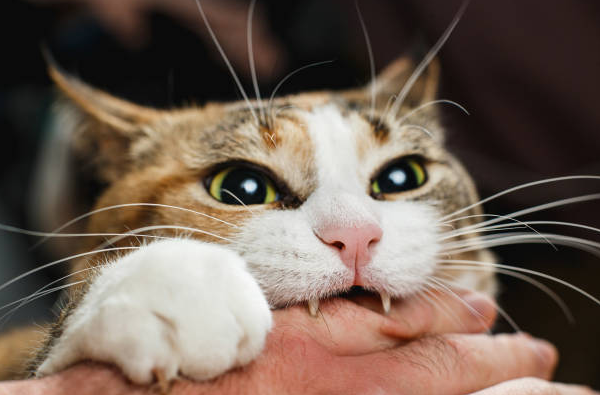
If you’ve ever had a cat gently nibble on your fingers, toes, or even your arm, you might have found it both endearing and puzzling. Is your cat hungry? Playful? Trying to tell you something? Let’s find out what’s behind this quirky behavior and what it means for your relationship with your fur baby.
Affectionate Grooming
One of the primary reasons cats nibble on their humans is rooted in affection. In the wild, cats groom each other as a bonding activity. When your cat nibbles you, it’s a way of showing love and trust, similar to how they would groom a fellow feline. These “love bites” can feel like tiny nibbles or gentle nips and are generally harmless.
Playfulness
Cats are playful creatures, and nibbling can be a form of play. If your cat is in a playful mood, they might view your fingers or toes as toys. This behavior is especially common in kittens and younger cats, who often have bursts of energy and a strong desire to engage in play. Just remember, their playful nibbles can escalate, so it’s essential to redirect their energy to appropriate toys.
Teething or Boredom
If you have a small kitten, they may nibble as a way to relieve the discomfort of teething. This behavior can extend into adulthood as well, especially if a cat is bored or has pent-up energy. If your cat is nibbling on you frequently, it might be a signal that they need more stimulation or playtime to keep them occupied.
Attention Seeking
Sometimes, a nibble can be a call for attention. If your cat is feeling neglected or wants to engage with you, nibbling can be their way of getting you to notice them. This is particularly true if they’ve learned that nibbling results in petting, playtime, or treats. If you find yourself being nibbled on more often, consider whether your cat might be craving a bit of your time and attention.
I Need You!
Cats are not always vocal creatures, and nibbling can serve as a form of communication. Your cat might be trying to tell you they’re hungry, want to play, or are ready for some cuddles. Paying attention to the context of the nibbling—such as what you’re doing when it happens—can help you decipher their needs.
Overstimulation or Frustration
On the flip side, if your cat is nibbling aggressively, it could indicate overstimulation or frustration. Cats can become easily overwhelmed by petting or play, leading them to react by nibbling or biting. If you notice that nibbling escalates to harder bites, it might be time to give your cat some space and allow them to decompress.
Tips for Managing Nibbling Behavior
If your cat’s nibbling becomes excessive or bothersome, here are some tips to help manage it:
- Distract them: Offer your cat toys to nibble on instead of your fingers. Wand toys, feather toys, and balls can provide appropriate outlets for their energy.
- Pay Attention!: Pay attention to your cat’s body language. If they start to show signs of irritation, like twitching tails or flattened ears, it might be time to back off.
- Engage: Keep your cat mentally and physically stimulated with puzzle toys, climbing structures, and interactive play to reduce boredom.
- Positive reinforcement: If your cat nibbles gently, reward them with affection or treats to reinforce that gentle behavior.
And so…
Nibbling is a common and often affectionate behavior among cats. Understanding the motivations behind it can help you respond appropriately and strengthen your bond with your feline friend. Whether it’s a love bite, a playful nibble, or a call for attention, your cat’s nibbling is just another way they express their unique personality and affection for you. So the next time your cat gives you a gentle nibble, know that it’s their way of saying, “I Love My Human!”
Ciao,

Disclaimer: The information and opinions herein are based on personal research. My Blog posts are intended for informational purposes only. I am not a Licensed Veterinarian nor am I any sort of medical professional. I am merely a human who takes caring for my pets seriously. My goal is to share my research with other like-minded individuals with the hope that it will help others in some small (or perhaps large) way.


